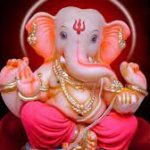Most Hindus see Ganapati as an alternative name for Ganessa, the elephantheaded son of Siva. Ganapati, literally “father of the ganas (groups),” was a title or concept that first appeared in the Rigveda. During the Vedic period ganas were the metrical groups, each of which had three syllables. The eight ganas represented all the metrical combinations of long and short syllables. A father of these metrical groups, a ganapati, would be a master of the Vedas themselves.
By the time of the Aitareya Brahmana, father of the ganas had become a title of Brahma, father of these Vedic meters. Brahma was also called Brahmanaspati, father of the commentaries, and Brihaspati, father of Brihat (the Vast), a title appropriated from Varuna. As father of the groups Brahma was not the leader of dwarfs or demons but the patron deity of the lists of the sacred words that were the vocabulary of Vedic schools. Brahma was the lord of wisdom who helped priests memorize the hymns and recite the prayers in the sacred meters. Two Vedic sages were also said to father ganas: Pratishakhyas and Yaska.
Sometimes mythology has layers of evidence, like archaeology. In the Ganessa myth cycle there seems to be clear evidence that the title lord or father of the ganas was still linked to the metrical groups. Vyasa dictated the entire Mahabharata with Ganesa, lord of the ganas, as his scribe. Ganesa used his single tusk as the stylus that marked green palm leaves with Vyasa’s verses. Ganesa was lord of the sacred words of scripture.
The second meaning of gana as “association” would put Ganesa in charge of a host of associates of his father, Ssiva. He was entrusted to lead Ssiva’s army of Ganas, now a class of dwarfs. With this association with Siva’s friends of the cremation grounds, Ganapati, now firmly identified with Ganessa, acquired the dual dimensions of benevolence and danger that has attracted such devotion to him in Hindu mythology and religion. Those who worship Ganessa as Ganapati exclusively are known as Ganapatyas; they worship him sometimes as clan deity
(kuladevata), sometimes as personal lord (ishtadevata).

